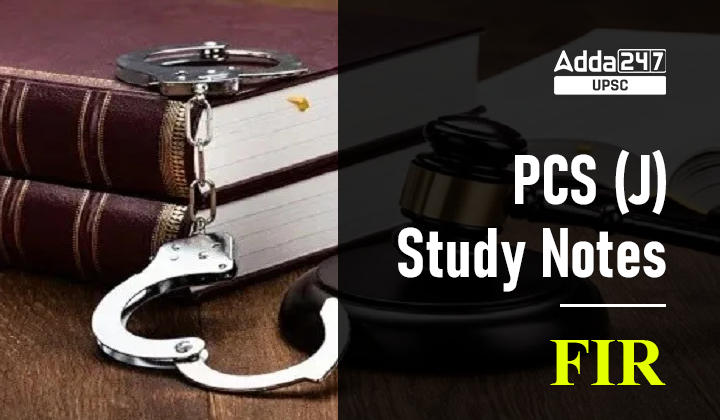Table of Contents
FIR
Section 154 of the Code of Criminal Procedure, 1973 governs the filing of a First Information Report (FIR), also known as the preliminary report of a criminal offence, with the officer in charge of a police station (CrPC). The term “First Information Report” (FIR) is not defined in the Code, but it generally refers to the earliest feasible oral information made to the police regarding the commission of a cognizable offence. A First Report of Innocence (FIR) is not meant to be a comprehensive account of what happened; rather, it is meant to set in motion the processes of criminal prosecution. It’s possible that the details you gave the police officer were correct when you filed a report.
Lodging of FIR
An FIR can be filed by anyone who possesses information about a potentially criminal act. He or she need not be a victim or eyewitness themselves. When a police officer becomes aware of the commission of a criminal offence, he or she may file a First Report of Incident (FIR) independently. It was decided in the case Hallu & Ors. vs. the State of M.P., “Section 154 does not require that the Report must be given by a person who has personal knowledge of the incident reported. The section speaks of information relating to the commission of a cognizable offense given to an officer in charge of a police station.”
Submitting a FIR is a straightforward process. The source must report to the police station (preferably close to the crime scene) and provide all relevant details about the crime. The informant has the option of providing information orally or in writing under section 154 of the Criminal Code. If the information is given verbally, the officer or someone working under his command must put it in writing. The source must read the report in its entirety. The source’s signature is required on every report that is converted to writing or submitted in written form.
The following topics must be addressed explicitly and without ambiguity in the FIR.
- Name and address of the complainant;
- Date, time, and location of the incident;
- Detailed account of what occurred;
- Names and descriptions of all those involved;
- Information about any witnesses.
प्राथमिकी
दंड प्रक्रिया संहिता, 1973 की धारा 154 एक पुलिस स्टेशन (सीआरपीसी) के प्रभारी अधिकारी के साथ एक प्रथम सूचना रिपोर्ट (एफआईआर), जिसे आपराधिक अपराध की प्रारंभिक रिपोर्ट के रूप में भी जाना जाता है, दाखिल करने को नियंत्रित करती है। शब्द “प्रथम सूचना रिपोर्ट” (एफआईआर) को संहिता में परिभाषित नहीं किया गया है, लेकिन यह आम तौर पर एक संज्ञेय अपराध के कमीशन के संबंध में पुलिस को दी गई जल्द से जल्द व्यवहार्य मौखिक जानकारी को संदर्भित करता है। मासूमियत की पहली रिपोर्ट (एफआईआर) का मतलब यह नहीं है कि जो हुआ उसका व्यापक लेखा-जोखा होना चाहिए; बल्कि, यह आपराधिक अभियोजन की प्रक्रियाओं को गति प्रदान करने के लिए है। यह संभव है कि रिपोर्ट दर्ज करते समय आपने पुलिस अधिकारी को जो विवरण दिया था वह सही था।
प्राथमिकी दर्ज करना
एक संभावित आपराधिक कृत्य के बारे में जानकारी रखने वाले किसी भी व्यक्ति द्वारा प्राथमिकी दर्ज की जा सकती है। उसे स्वयं पीड़ित या प्रत्यक्षदर्शी होने की आवश्यकता नहीं है। जब एक पुलिस अधिकारी को किसी आपराधिक अपराध के होने की जानकारी हो जाती है, तो वह स्वतंत्र रूप से घटना की पहली रिपोर्ट (एफआईआर) दर्ज कर सकता है। हल्लू और अन्य मामले में यह निर्णय लिया गया था। बनाम मध्य प्रदेश राज्य, “धारा 154 के लिए यह आवश्यक नहीं है कि रिपोर्ट उस व्यक्ति द्वारा दी जानी चाहिए जिसे रिपोर्ट की गई घटना की व्यक्तिगत जानकारी हो। यह खंड एक पुलिस थाने के प्रभारी अधिकारी को दी गई संज्ञेय अपराध के कमीशन से संबंधित जानकारी की बात करता है।
एफआईआर जमा करना एक सीधी प्रक्रिया है। स्रोत को पुलिस स्टेशन को रिपोर्ट करना चाहिए (अधिमानतः अपराध स्थल के करीब) और अपराध के बारे में सभी प्रासंगिक विवरण प्रदान करें। मुखबिर के पास आपराधिक संहिता की धारा 154 के तहत मौखिक या लिखित रूप में जानकारी देने का विकल्प होता है। यदि सूचना मौखिक रूप से दी जाती है तो अधिकारी या उसके अधीन कार्य करने वाले किसी व्यक्ति को उसे लिखित रूप में अवश्य देना चाहिए। स्रोत को रिपोर्ट को पूरी तरह से पढ़ना चाहिए। प्रत्येक रिपोर्ट पर स्रोत के हस्ताक्षर की आवश्यकता होती है जिसे लिखित रूप में परिवर्तित किया जाता है या लिखित रूप में प्रस्तुत किया जाता है।
निम्नलिखित विषयों को एफआईआर में स्पष्ट रूप से और अस्पष्टता के बिना संबोधित किया जाना चाहिए।
- शिकायतकर्ता का नाम और पता;
- घटना की तारीख, समय और स्थान;
- जो हुआ उसका विस्तृत विवरण;
- शामिल सभी लोगों के नाम और विवरण;
- किसी भी गवाह के बारे में जानकारी।



 TSPSC Group 1 Question Paper 2024, Downl...
TSPSC Group 1 Question Paper 2024, Downl...
 TSPSC Group 1 Answer key 2024 Out, Downl...
TSPSC Group 1 Answer key 2024 Out, Downl...
 UPSC Prelims 2024 Question Paper, Downlo...
UPSC Prelims 2024 Question Paper, Downlo...




